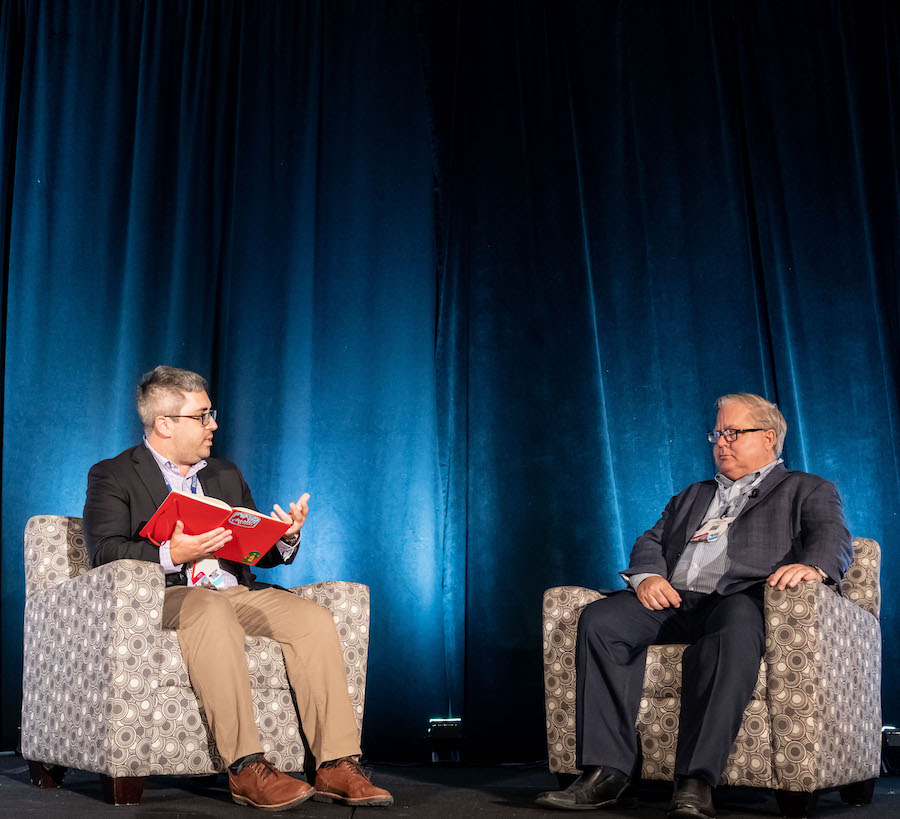Why America’s Wage Gap Leads to Its Decline—and What to Do About It


Only the revival of workers’ bargaining power can remedy the desperate situation of the working poor in this country, according to Michael Lind, in his book Hell to Pay: How the Suppression of Wages Is Destroying America.
Lind, a columnist at Tablet and a fellow at New America, outlined the decline of American workers’ bargaining power in a fireside chat at From Day One’s conference in Austin, Texas. Interviewed by Will Anderson, managing editor of the Austin Business Journal, Lind offered some remedies.
Low-wage jobs were still living wage positions in the 1920s, but now they are poverty jobs. Lind points to his grandfather, who was earning a living wage as a janitor in the 1920s.
Today, janitors, fast food workers, nurses aides, construction laborers, and others can only meet the monthly bills with food stamps (EBT), housing vouchers, and earned income tax credits.
Lind calls the American workplace a two-tier system–the working poor on the bottom create benefits that redound to employers. But the costs of the low wage system are spread across the whole country in the form of subsidies.
“You’re privatizing the benefits to the employers and to the consumers of goods and services produced by low wage workers. And you’re socializing the costs to the rest of us, to the taxpayers, we have to pay,” he said.

Now 25% of US jobs are in poverty positions versus 3% in Norway, a country he has studied for this work.
Why? The National Labor Relations Act (NLRA), which was to support workers’ bargaining power, is flawed, Lind said, calling its decline the main reason why today only 6% of the workforce is protected by unions versus 20% in the 1940s and ‘50s.
Nor is this decline the fault either of globalization or technology, as so many believe. Instead, Lind points out, other democracies have experienced the same transformations, and yet their low-skill workers can thrive. Rather it is the encroachment of employers and institutions over the power of production and labor.
Besides the flaws of the NLRA, Lind lambasted the proliferation of non-compete clauses in employment contracts. Meanwhile, legal or unauthorized immigration also bolsters employers’ ability to suppress wages.
Paying higher wages is not a simple solution.
One reason is that today’s academic economists hold the belief that wages rise as productivity does. This belief is untrue, he says.
Instead, we want to strengthen the bargaining power of workers in sectors.
Despite their illegality under trust law, companies still use salary bands – employers across industries establish wages in relative complicity.
Instead, he proposes reviving a century-old system called wage boards. Here, the governor or the mayor appoints industry representatives, say fast food, and the workers set wages and hours.
In New York State in 2015, under Governor Andrew Cuomo, the workers “came up with minimum wages, hours, scheduling benefits only for fast food workers in New York.”
“I argue that this kind of granular specific approach is better than simply raising the minimum wage,” Lind said.
Employers, governments, or institutions cannot remedy this system that keeps the poor poor. Instead, it’s the workers themselves that can have the muscle to repair our unjust system.
Francine Brevetti is a business writer, ghostwriter, and author, residing in San Francisco, California.
The From Day One Newsletter is a monthly roundup of articles, features, and editorials on innovative ways for companies to forge stronger relationships with their employees, customers, and communities.